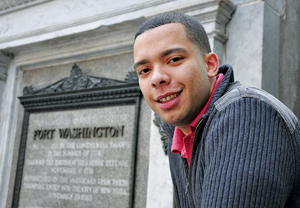Summer barbecues in the park, little league baseball, and the lilt of Caribbean music wafting through the air—these are among Wander Cedeño’s fondest memories of his childhood in Washington Heights, New York.

Photo by Janet Sassi
His parents emigrated there from the Dominican Republic before he was born in search of a better life for their family.
Not all of his memories are quite as pure. After all, growing up in an urban, mixed-socioeconomic neighborhood offered a street-smart view of life’s harsh realities.
“I remember seeing drug dealings on street corners, fistfights by the basketball courts, and gang rivalries that climaxed during my youth,” Cedeño said.
What kept him on the right path was the guidance of his parents and the education they struggled to provide for him, as well as mentors he met along the way. One was a nun who believed in his potential so much that she contributed to his parochial school education when his parents were considering moving him to the affordable public school. Another was an educator who took Cedeño under his wing to pursue campus ministry and community service during his high school years at Mount Saint Michael Academy in the Bronx. A third was an upperclassman who helped him make the transition into college life.
Their generosity of spirit helped inspire Cedeño’s dual interest in economics and public service. An unexpected meeting with Leonel Fernandez, president of the Dominican Republic, whom he personally greeted on Fordham’s campus in 2008, motivated him to pursue the International Political Economy and Development (IPED) program offered in the Graduate School of Arts and Sciences (GSAS).
He wasn’t new to Fordham: He graduated from the Gabelli School of Business in 2010. This August, Cedeño will celebrate another hard-earned achievement on Fordham’s campus as he receives his master’s degree from the GSAS’ IPED program.
“College was a big deal for me,” he said. “I was the first member of my family to attend a four-year institution. In many ways, I carried the hopes and dreams, along with the pressures, of my loved ones to the Rose Hill campus. Through it all, they supported me and instilled the value of higher education and hard work.”
A rare candidate who entered the IPED program just after he earned his undergraduate degree, Cedeño feels he benefited from the experiences and knowledge of his fellow students, many who had spent time in the working world already. The bonds they forged are everlasting, especially after spending a few weeks last year in Manila, Philippines, for a project assessment course.
“We evaluated NGOs and other federal agencies, qualitatively and quantitatively,” Cedeño said. There were 12 students on the trip. “We focused on the farming initiative, and the impact of the typhoon in 2010,” he said.
Cedeño’s next challenge will be his charge in the selective New York City Urban Fellows Program, to which he was accepted earlier this year. Though he’s not sure yet which agency he’ll be assigned to work with—interviews are scheduled this summer—he knows the experience will be pivotal. As he is considering enrolling in law school, and has his sights set on a career for social justice, this experience as a civil servant will be invaluable.
In addition to an internship with the Brooklyn Borough Hall, Cedeño has been active in the New York City Church of Christ, where he has led bible discussions as a campus ministry intern. He says his involvement in his church has allowed him to “shine” and “do things the right way,” opportunities he feels are mirrored in his Fordham education, with its emphasis on ethics. There have been role models too, he said, who have inspired him to achieve great things.
“Undeniably, I stand on the shoulders of dozens of individuals who have challenged, disciplined and loved me,” Cedeño said. “Because of these people, I can make a positive contribution to next year’s Urban Fellows class.”
— Claire Curry
